HOW
WE MANAGE
CJ CheilJedang believes that growth in the supply chain occurs when all suppliers fulfill their responsibilities for their employees, society and the environment, and eventually enhance sustainability. Therefore, achieving a sustainable supply chain represents growth for all of us. At CJ CheilJedang, we pursue systematic management of the supply chain to foster sustainability within the supply chains of the domestic and the global Food and BIO industries. In the process of procuring raw materials, we are expanding the procurement of eco-friendly raw materials in ways that protect biodiversity and do not harm the environment. Also, based on partnerships with suppliers, we strive to grow together through various cooperative projects.

Sustainable
supply chain
strategy
To enhance the sustainability of supply chains, CJ CheilJedang supports the strengthening of suppliers’ competitiveness based on its mutual growth activities. Also, the company established ‘Supplier Code of Conducts’ as well as ‘Sustainable Raw Material Sourcing Policy’ in 2019 so that the supply chain can fulfill its social and environmental responsibilities.
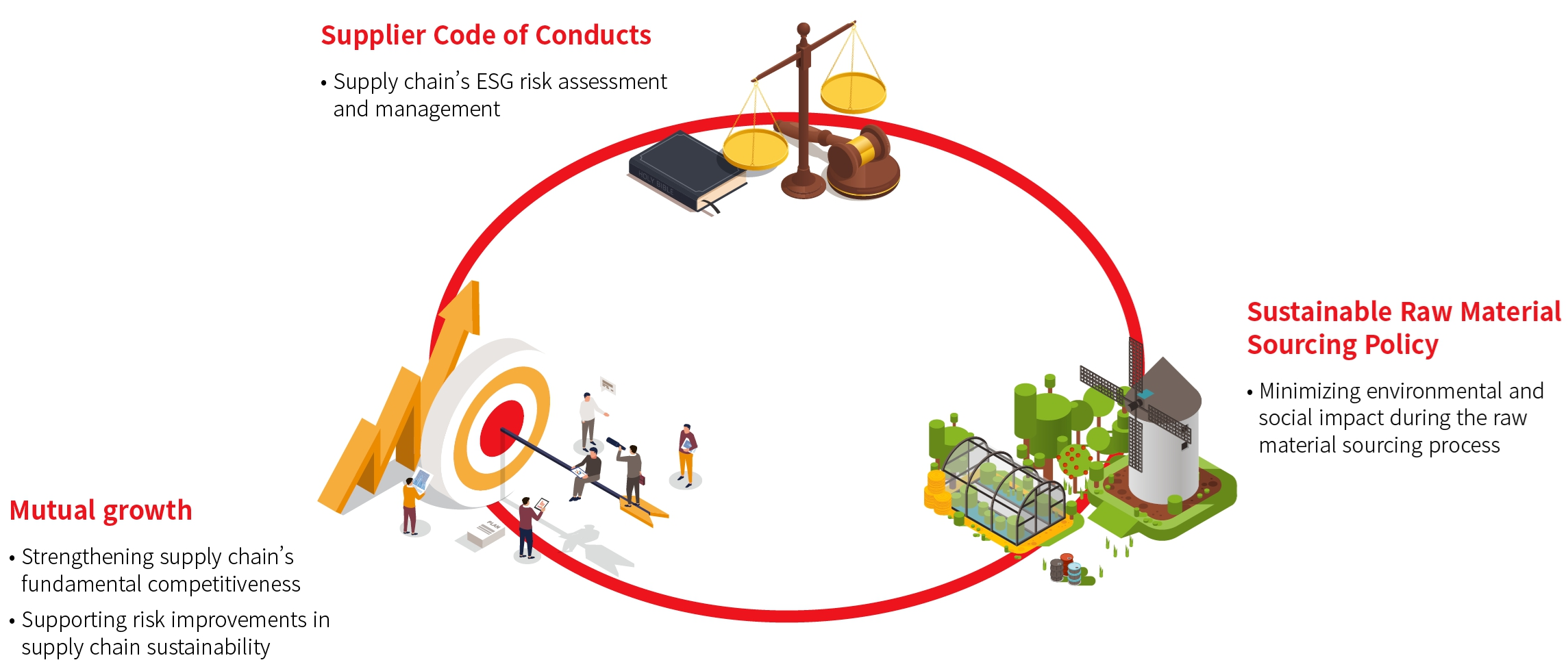
Supply Chain
Governance
At CJ CheilJedang, the Corporate Sustainability Committee under the Board of Directors takes charge of the Sustainable Supply Chain Policy, and operates a supply chain working committee for the implementation of the supply chain management policy and a company-wide cooperation. The supply chain working committee operates based on the leadership of the Purchasing Department of Food, Grain, and BIO sectors, and executes tasks that enhance the supply chain’s sustainability through collaboration with departments by function, including human rights, safety, etc.
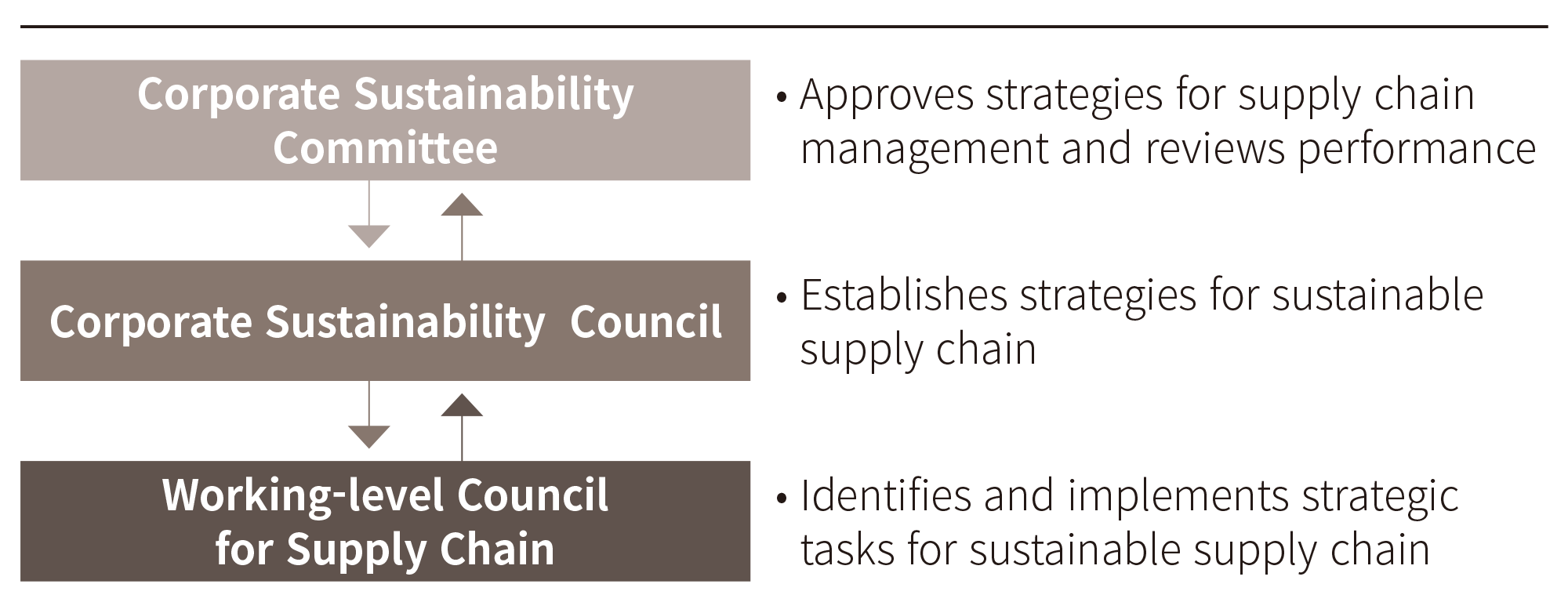
Supply Chain Management Policy
Supplier Code of Conducts
CJ CheilJedang published the Supplier Code of Conduct on supply chain ethics and human rights in 2017. The Code of Conduct was applied to manage supply chain sustainability. In 2019, we newly announced the Supplier Code of Conduct for ethics, human rights, safety and environment in line with the global expansion of our businesses. We are applying the new Code of Conducts to the overall supply chain’s sustainability.
Sustainable raw material sourcing policy
To enhance the soundness of the supply chain through traceable and sustainable raw material procurement, CJ CheilJedang has established a Sustainable Raw Material Sourcing Policy. This policy describes our approach to major raw materials such as raw sugar, corn, soybeans, palm oil, rice, eggs and seafood. CJ CheilJedang applies this policy to the entire supply chain to reinforce the sustainability of the food industry in areas of forestry and biodiversity.
Supply Chain
Management
System
CJ CheilJedang has diverse supply chains across the world from raw materials to products, packaging materials, and facilities. To enhance environmental and social sustainability for the global supply chains, including the area where raw materials are produced to the production facilities of the raw materials, we are requesting their compliance with the Code of Conduct. Based on this, we have built a supply chain management system and are enhancing supply chain sustainability.
Status of Compliance to the Supplier Code of Conduct
In order to include sustainability factors in the selection and evaluation of suppliers, the Standard Agreement specifies quality, safety, financial soundness, and compliance to the Supplier Code of Conduct in areas including human rights, environment, and anti-corruption. In addition, to prompt self-directed improvement by the suppliers based on the Supplier Code of Conduct, we are revising and operating Supplier Code of Conduct guidelines.
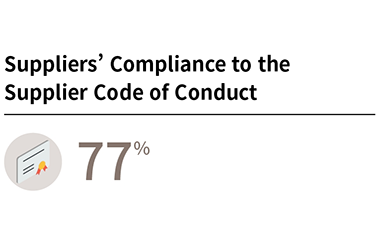
Management of the supply chain and key suppliers
CJ CheilJedang evaluates ESG factors such as human rights and safety upon new registration of suppliers to determine the possibility of further transactions. In addition, suppliers of raw materials are managed through assessments and regular audits. If the result of the assessments proves to be unfit, a penalty is given depending on the seriousness of the matter along with recommendations for improvement. In addition, CJ CheilJedang selects and manages key suppliers based on scale of transactions, substitutability, and sustainability.
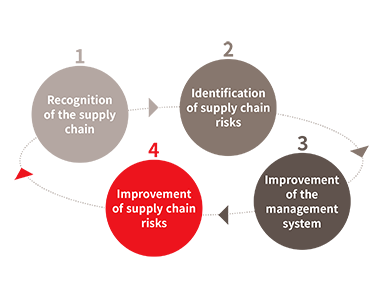
Enhancing transparency in the supply chain
Advancing the G-SRM system
G-SRM(Global Supplier Relationship Management) operates on a cloud-based purchasing system to increase transparency in purchasing and to streamline purchasing operations. Also, through automatic sharing of bid results and consent of supply chain ethics/human rights management, we have strengthened transparency as well as ESG activities. The new system is supported in five languages and compatible with all internet browsers which increased user accessibility, and enabled online global technical support by achieving interactive communication through online systems.


Efforts for
‘Sustainable
Soybeans’
CJ CheilJedang is practicing sustainable sourcing through various projects to minimize environmental impact such as deforestation, which can occur during the soybean cultivating process around the world.
Expanding operation of CJ Selecta, Amazon Biome Free
In accordance with our declaration to ‘Deforestation-free’, CJ Selecta executes the ‘Seed Project’ with the goal to expand the purchase of non-Amazon Biome soybeans and to purchase soybeans outside of the Amazon Biome in the Minas Gerais region of Brazil. With the ‘Seed Project’, we have formed a partnership with major manufacturers of concentrated soybean protein in Brazil. With this we are securing and operating a mutual growth system where we supply farmers outside of Amazon with seeds, provide support for funds, and purchase cultivated soybeans.
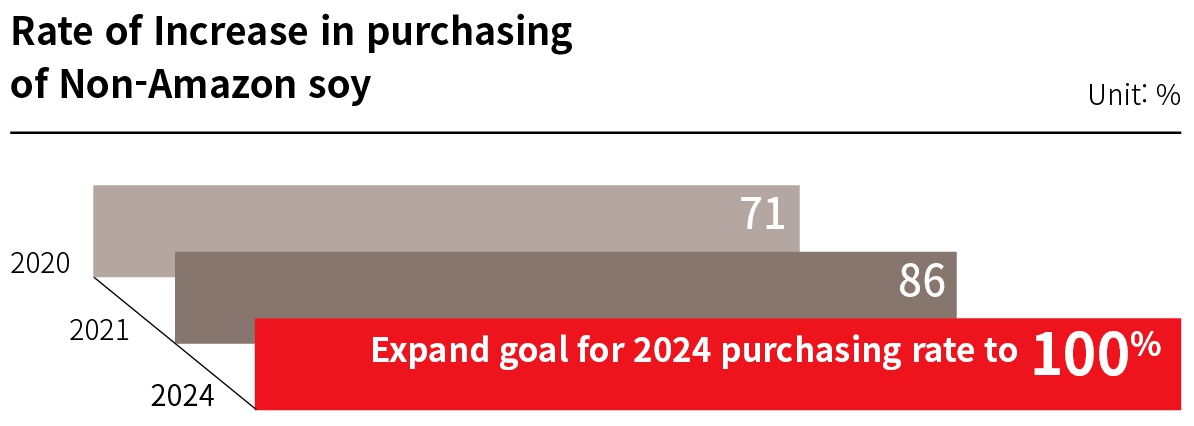
Deforestation-free
In order to prevent the destruction of the ecosystem caused by deforestation or slash-and-burn cultivation, we do not source soybeans from such regions and instead strive to use soybeans procured in sustainable methods and try to expand the percentage of sustainably procured soybeans. Our Non-GMO soybeans are certified by Pro-Terra(a global standard certificate that requires sustainability and traceability based on compliance with 10 principles, such as legal compliance, respect for human rights, biodiversity conservation, environmental policies, waste policy, and non-use of GMOs), and we are working to build a framework to acquire the same certification for our GMO soybeans.
Biodiversity Policy
In Brazil, the largest producer of plant-based high-protein soybeans, there has been cases of forest damage because economic benefits were prioritized over forest protection. Therefore, biodiversity issues occurred. As a response to this, CJ CheilJedang has made a declaration for ‘Deforestation-free’ in 2021 as an effort to preserve a sustainable environment. In accordance with the Biodiversity Policy, we will strive to prevent and mitigate any negative impact on biodiversity that may arise in our business.
Efforts for
‘Sustainable
Palm Oil’
Palm oil derived from palm trees is highly productive and economical, and is being commonly used in food, cosmetics, cleaning agents, and as a raw material for BIO energy. However, the surge in palm oil consumption has led to an indiscriminate rise of palm oil production facilities. As a result, several environmental problems were induced including forest devastation, biodiversity loss, air pollution through shifting cultivation, as well as social problems such as violations of housing rights of the indigenous people and other human rights violations.
Sustainable Palm Oil Policy
The solution to the palm oil problems is to make a conscious effort to use palm oil that does not result in deforestation. In 2021, CJ CheilJedang established the ‘Sustainable Palm Oil Policy’ to minimize the negative impact on the environment and society caused by palm oil production and consumption, and to produce and sell sustainable palm oil. In addition, beginning in 2022, we are only using eco-friendly palm oil that has been certified through RSPO(Roundtable on Sustainable Palm Oil) for B2B (business-to-business) transactions. Starting with our domestic business sites, we plan to expand this movement to our overseas subsidiaries and suppliers.


Mutual Growth
Based on the shared growth philosophy of the CJ Group, CJ CheilJedang pursues win-win cooperation with the goal of maximizing capabilities of the supply chain. In particular, we continuously operate the ‘CJ Partners Club’ to maintain sound partnership, and we also carry out the ‘Happy Companion’ project to secure sales channels for local food companies. In addition, we not only support with education, fund, and technical support, but we also provide support in quality and cleanliness as well as employment safety through various shared growth programs that offer practical benefits to our partner SMEs.
Released the first recipients of the Naeil Chaeum Deduction System as the first in the private sector
By launching a mutual cooperation Naeil Chaeum Deduction System*, we are contributing to our partner SMEs’ stable employment and the alleviation of wage disparity. As a model that realizes mutual growth by lowering the burdens of SMEs with our support with the share of expenses, CJ CheilJedang released the first group of recipients that has reached the mutual cooperation Naeil Chaeum Deduction System. We released 7 people from 5 suppliers and plan to expand our support in the future.
* A system in which workers of our suppliers deposit deductions jointly with CJ CheilJedang and the workers receive the savings upon maturity
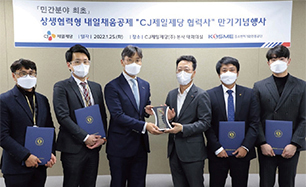
Fair Trade
Operation of the Deliberation Committee on subcontract transactions
We manage major agenda and activities related to our suppliers through a monthly meeting by the Deliberation Committee on subcontractors. In 2021, we worked to collect and improve the grievances of our suppliers through the committee.
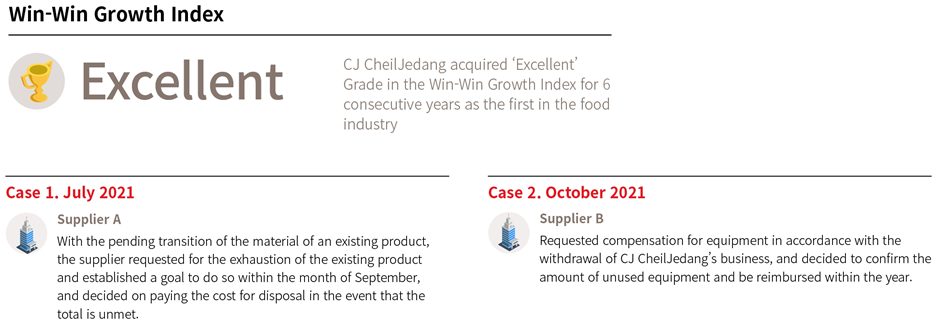
Operating the Supply Chain Management System(CJ SRM)
By linking the company’s internal computer networks, we automatically issue documents of our suppliers’ order placements, receipts, and test results, etc. in real time. Regarding subcontract transactions, we digitally adjust unit prices and sign price agreements with the suppliers.
Support for the suppliers using ESG bonds
In 2021, CJ CheilJedang issued an ESG bond worth KRW 60 billion for the first time in the CJ group, adding KRW 16 billion to the mutual growth funds, and allocating KRW 44 billion to shorten the payment cycle for the suppliers.